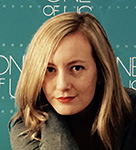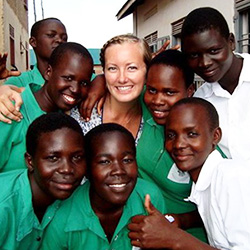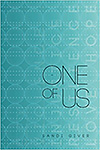Talking with Sandi Giver (Uganda), author of ONE OF US

Sandi Giver
In June 2017 Sandi Giver published One of Us: Sex, Violence, Injustice. Resilience, Love, Hope with Peace Corps Writers. She describes the book this way: It is “a book with a mission, challenging societal perceptions, and a community of love :-).”
Here Sandi answers some questions put to her by Peace Corps Worldwide.
•
Where and when did you serve in the Peace Corps?
In Pader, Uganda from 2009 to 2011.
What was your Peace Corp project assignment?
I was a Community Health/Youth Development Specialist.
Tell us about where you lived and worked.
Pader is a small village with one main road linking the simple market and small stores. It is a former internally-displaced-persons [IDP] camp established during the 21+ years of conflict by the Lord’s Resistance Army (LRA) with the Ugandan government.
Originally, I lived on a compound in a thatch-roof hut. Due to the potential safety risk that a villager might get upset with the landlords and burn the hut down (huts were torched during the conflict) I moved into a former INGO [international non-governmental organization] compound. I went from a pit latrine and staring up at the sky during showers to my very own small space that had a real door and a bathroom space where I used grey water from standing in a basin when I showered to “flush” the non-functional toilet.
Electricity came to the village later in my service, and being able to occasionally charge my laptop or have lights on at night was a game changer!
Pader Girls Academy was the one residential school in Uganda that allowed young mothers to study and bring their children up to the age of two to live with them. We had around 240 students ages 13 to 30 who were either formerly abducted by the LRA to be used as child soldiers, porters, or sex slaves to rebel commanders, or who lived in the IDP camps and experienced trauma and severe poverty there. The school provided both formal education as well as vocational training.
 What kind of work did you do?
What kind of work did you do?
I facilitated classes dealing with the psychosocial effects of Post Traumatic Stress Disorder in a post conflict area for young women impacted by years of war. Basically, I interviewed the teachers about presenting issues and adapted the Peace Corps life skills manual to address the needs directly related to trauma.
What is your educational background?
I studied Social and Behavioral Sciences at Indiana University/Kokomo, and am currently pursuing my Masters in Social Work from the University of Maryland/Baltimore.
Did your college education help you as a PCV?
Generally speaking, yes. I learned to be inquisitive, how to logically go through processes, and how to be productive with a variety of work methods. More importantly, I believe my work with different populations including at-risk youth, the mentally handicapped, pregnant teens, and also with former sex workers overseas helped prepare me for service.
What have you done since the Peace Corps?
Rather than move back to Indiana, I moved to DC where I became the Communications Director of Human Trafficking Search. In July of 2012, I started working in the Office of Safety and Security at Peace Corps, HQ.
What are you doing now?
I’m completing my last year of social work grad school while working in the Protection Unit/TIP at Catholic Relief Services.
 How would you describe your book in one sentence?
How would you describe your book in one sentence?
One of Us: Sex, Violence, Injustice. Resilience, Love, Hope delves into the complexities of sexual violence and challenges of seeking legal justice.
What prompted you to write the book?
A US Navy sailor deployed to Uganda chose to change a consensual interaction into a violent rape against me, a Peace Corps Volunteer. NCIS agents flew to Uganda and took my statement. I knew that I needed to remember every detail so I started writing. Rather than write a new blog post for the public, I privately wrote to process what was happening.
How long did it take for you to write your book?
Living out the tragedies depicted in the One of Us manuscript took a year and a half. I focused on healing and stability for about a year after trial.
All in all, the final product took roughly 5 years with the help of a team. Friends were extremely helpful throughout the process of producing the book offering their skills varying from designing the cover, music for a gofundme video, and setting up an LLC. I could not have published One of Us without the help of everyone in the acknowledgement page.
Tell about your writing process.
One of Us was written all over the globe — there is a map at the beginning of the book to help visualize this. I wrote late at night if I couldn’t sleep and needed to release the thoughts. I scribbled down notes from calls with the prosecutor and would later type them up. I wrote a chapter one year after the assault while on a flight to the third proposed trial date. My brick of a laptop went everywhere with me. Coffee shops, restaurants with outdoor seating and a beer or glass of wine became my norm for the ideal editing setup.
During the process did you belong to a writers group, share reading and critiquing, or have any other way of bouncing off your writing and thinking?
I was very nervous to share my story with others that I knew, to share in a genuine and raw way about how someone else chose to sexually violate my bodily integrity. With time, testing the waters with small tidbits of information, and supportive friends, I was able to build the courage needed to allow others into my story. I really wanted to make One of Us a solid book that was readable and easy to understand — this required people from different backgrounds to get involved.
A couple of Peace Corps related individuals in the book provided feedback on the content and timeline. A non-RPCV friend and I started a Tuesday Night Writing Club where she used her analytical skills as a therapist to dig deeper into issues. Peace Corps people have their own language and way of talking about services- having an external individual unfamiliar with Peace Corps terminology or processes review the manuscript helped with making the story easier to understand by the public. I didn’t want to upset any one group, especially Peace Corps, therefore I asked feedback from friends who are lawyers, law enforcement, activists, survivors, military wives, therapists, and the like.
What are you doing to promote your book?
I see One of Us as a tool for social change that takes time and dedication. 2017 so far has been the soft launch period, building a brand and recognition while working out some kinks. One of Us has an online presence between the website, Instagram, Twitter, and Facebook page.
Working full time, attending grad school, and publishing a book all at once was a bit exhausting. My schedule is calmer now so I hope to give One of Us the attention it deserves.
How has the publication of your book impacted your interactions with other victims of sexual violence?
There have been multiple unexpected outcomes of writing a book about my personal experience with sexual violence. Individuals who I know, and others that I don’t, have reached out to me through email and different forms of social media. Individuals who were violated by active duty military who needed comfort in knowing they weren’t alone yet not ready to speak with a therapist. Women who were in abusive relationships for years asking about long term healing and feelings of guilt. Individuals who were able to process their childhood experience of being abused by a stepfather and their relationship with their mother. An acquaintance from university who asked how to support a friend who had just been drugged and assaulted that weekend.
I’ve stayed up late providing a listening ear from my laptop, walked around an art gallery messaging on Facebook about the recovery process, sat in the back seat of a car texting with the individual who was drugged answering questions about my own sexual assault forensic examination.
On September 23rd, 2017, an individual chose to rape a good friend of mine, which is horrific. She posted a video on Facebook 7 hours after the assault while still in the hospital. After completing her sexual assault forensic examination, she spoke out about consent, resources, the process, taking care of yourself, knowing you aren’t alone, and the like. Since we live on different coasts, I sent her a simple “I love you” text. She responded with “I love you. You inspired me to speak out.” Within 24 hours, the video already had over 13,000 views. We never know who we will share our vulnerabilities with and the ripple effect they will have throughout time.
Each of the interactions can be mentally difficult, but at the end of the day I know the impact of sexual violence and how vital the support of trusted individuals was for me. One of Us was difficult to write and risky to share, but it has also provided a public platform to positively impact individuals. My hope is that I will be an inspiration for others to be a part of positive social change and that together we can make a difference in the world around us.
•
One of Us: Sex, Violence, Injustice. Resilience, Love, Hope
by Sandi Giver (Uganda 2009–11)
Peace Corps Writers
June 2017
260 pages
$14.95 (paperback)
No comments yet.
Add your comment